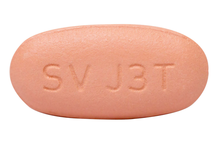Juluca is a fixed-dose combination tablet containing two anti-HIV drugs, dolutegravir and rilpivirine. Juluca is manufactured and marketed by ViiV Healthcare.
Dolutegravir is an integrase inhibitor also marketed alone as Tivicay, in combination with lamivudine as Dovato, and in combination with lamivudine and abacavir as Triumeq. Rilpivirine is a non-nucleoside reverse transcriptase inhibitor (NNRTI) also marketed alone as Edurant, in combination with tenofovir disoproxil fumarate and emtricitabine as Eviplera and in combination with tenofovir alafenamide and emtricitabine as Odefsey. An injectable form of rilpivirine is marketed as Rekambys.
Juluca is licensed for the treatment of HIV in people who already have an undetectable viral load for six months and no resistance to integrase inhibitors or NNRTIs. Juluca does not need to be combined with other anti-HIV drugs.
Juluca was approved in the United States in November 2017 and in the European Union in May 2018.
Effectiveness
Juluca was approved based on results from the SWORD 1 & 2 studies, in which 1024 adults with viral load < 50 copies/ml were randomised to continue their existing antiretroviral regimen or switch to Juluca. After 48 weeks there was no significant difference in the proportions with undetectable viral load (95% in each arm). (Llibre) Viral suppression was sustained after 100 weeks of follow-up. After week 52, 477 of 511 in the standard-treatment group had switched to Juluca. Eighty-nine per cent of the early switch group and 93% of the late-switch group maintained a viral load below 50 copies/ml. (Aboud)
Taking it
Juluca is taken as one pink tablet once a day with food. Juluca contains 50mg of dolutegravir and 25mg of rilpivirine. An additional dose of 25mg of rilpivirine should be taken as a separate tablet when Juluca is taken at the same time as treatment with rifabutin.
H2-recepter antagonists such as famotidine, used to reduce the amount of stomach acid, should be taken at least 4 hours after or 12 hours before Juluca.
Antacids containing magnesium should be taken at least 6 hours before or 4 hours after Juluca.
Calcium supplements, iron supplements or multivitamins should be taken at the same time as Juluca, with a meal.
Side effects
Common side effects of Juluca include:
- difficulty in sleeping, abnormal dreams, depression, depressed mood, anxiety, headache, dizziness, drowsiness, fatigue
- nausea, diarrhoea, abdominal pain, vomiting, flatulence, dry mouth, decreased appetite
- increased liver enzymes or bilirubin or creatinine phosphokinase or lipase or pancreatic amylase
- decreased white blood cell count, haemoglobin or platelet count, increased total or LDL cholesterol, increased triglycerides
- rash, itching.
Weight gain has been observed in people with HIV after starting antiretroviral treatment. Dolutegravir treatment has been associated with greater weight gain. (Sax)
Drug interactions
You should not take Juluca if you are currently taking medicines from the following groups:
- products that contain St John’s wort (a herbal remedy used for depression and anxiety)
- rifampicin and rifapentine (used to treat some bacterial infections such as tuberculosis)
- carbamazepine, oxcarbazepine, phenobarbital and phenytoin (used to treat epilepsy and prevent seizures)
- proton pump inhibitors, such as omeprazole, esomeprazole, lansoprazole, pantoprazole, rabeprazole (used to treat acid reflux)
- systemic dexamethasone (anti-inflammatory steroid, many uses for treatment of serious conditions)
- dofetilide (treatment for irregular heartbeat).
Pregnancy
Juluca is not recommended for women who are pregnant or who might become pregnant. Juluca should be used with effective contraception. Juluca is not recommended if you are breastfeeding.
Children
For further information about side effects and drug resistance, see entries for the individual agents dolutegravir and rilpivirine.
Llibre JM et al. Efficacy, safety, and tolerability of dolutegravir-rilpivirine for the maintenance of virological suppression in adults with HIV-1: phase 3, randomised, non-inferiority SWORD-1 and SWORD-2 studies. Lancet HIV, 391(10123):839-849, 2018. You can read more about this study in our news report.
Aboud M et al. Efficacy and safety of dolutegravir-rilpivirine for maintenance of virological suppression in adults with HIV-1: 100-week data from the randomised, open-label, phase 3 SWORD-1 and SWORD-2 studies. Lancet HIV, 6(9):e576-e587, 2019.
Sax P et al. Weight gain following initiation of antiretroviral therapy: risk factors in randomized comparative clinical trials. Clinical Infectious Diseases, 71 (6): 1379-89, 2019. You can read more about this study in our news report.

